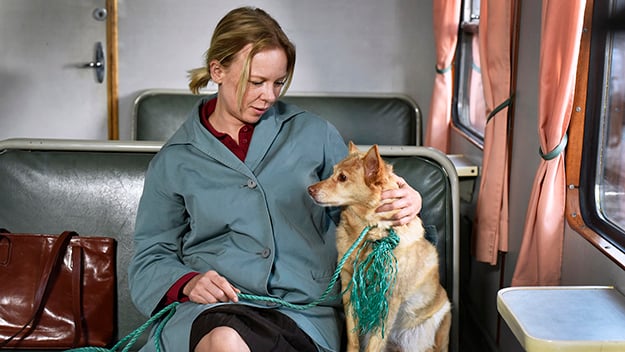Cannes 2023: Dog Days
This article appeared in the May 26, 2023 edition of The Film Comment Letter, our free weekly newsletter featuring original film criticism and writing. Sign up for the Letter here. Catch up on all of our coverage of the 2023 Cannes Film Festival here.

Fallen Leaves (Aki Kaurismäki, 2023)
It is Friday the millionth of May, and we are approaching the eerie end zone of the Cannes Film Festival. The tide of rosé-bleary journalists has begun to ebb from the Azure Coast, though the last Competition films—The Loach and The Rohrwacher, as The Old Oak and La chimera are termed here—still had not screened as of this morning. The uncharacteristic rains of last week have broken, but though the skies are blue, the air is muggy, and everyone would really love a nice, long nap. These are the dog days of Cannes, and not just because of all the dogs.
The unusually significant canine contribution to this year’s Official Selection was first noted by British journalist Tim Robey a week ago, when we were just four days into the festival and I still had all my hair. Since then, there have emerged two leading contenders for the Palm Dog—the unofficial Best Dog award which is one of those in-jokey Cannes traditions that appear insufferable from the outside but are kind of irresistible once you’re here. The first, and to my mind most deserving, candidate is the border collie Snoop (an adorable name, only bested by the dog’s real name, Messi) in Justine Triet’s fantastic Anatomy of a Fall. As Beatrice Loayza observed in Tuesday’s Film Comment dispatch from Cannes, Snoop is a “figure of startling complexity” who plays a pivotal role in the perspective-shifting plot, as well as occasionally driving the very movements of Triet’s inquisitive, inventive camera.
But Snoop found some major competition when Aki Kaurismäki’s lovely Fallen Leaves debuted this week. A sweet, sharp, drolly cinephiliac love story that bucks this year’s trend for excessive length at just 81 minutes, the Finnish auteur’s latest gem features a lovely canine who, we discover in the film’s final, Modern Times–echoing moments, is named Chaplin. Blue-collar striver Ansa (Alma Pöysti) rescues the charming mutt from probable euthanasia at just the point when it seems her halting relationship with middle-aged alcoholic Holappa (Jussi Vatanen) might have halted altogether. And while we root for the typically inarticulate, Kaurismäkian human pair from the outset, there’s a gentle profundity to the way in which, while they’re apart, Chaplin fills the hole in Ansa’s lonely heart, just as a self-admitted stint in rehab improves Holappa’s lot. Two broken people might need each other, but only two whole souls can properly love.
There is an annoying sense that Kaurismäki, like Hong Sangsoo, is one of those distinctive directors whom you must declare yourself either for or against before offering any assessment, because all takes are only ever the hating of a hater or the stanning of a stan. The poster-child for this critical phenomenon is, of course, Wes Anderson, whose Asteroid City was Tuesday’s big Competition premiere. So, reluctantly, for the record: I am traditionally an Anderson apologist—and yes, that includes The French Dispatch. I’ve never minded that “he always does the same thing,” because he’s the only one doing it. So it came as quite a surprise to me to discover how perfectly I loathed Asteroid City, an utterly aggravating alien-visitation yarn that relies more strenuously than Anderson’s previous efforts on the star power of an overstuffed A-plus-lister cast to compensate for an almost complete lack of characterization. Matt Dillon’s character? “Mechanic in Overalls.” Steve Carell’s? “Hotel Manager in a Visor.” The narrative is also constructed in a laboriously oblique way, with framing devices framing other framing devices and so on; the actual heart of the story is placed so far away it’s like we’re looking at it through the wrong end of a telescope. This makes Asteroid City so much work for so little appreciable reward that I sat there horrified, suddenly wondering if this is what people who don’t like Wes Anderson movies have always seen when watching Wes Anderson movies.
There might have been a dog amid all that pointless kerfuffle, and if there is, it’s no doubt played by some superstar Westminster-winner in a pair of rose-pink plus fours; I can’t really remember. It’s amusing to imagine, however, those terra-cotta-pastel desert locations being overrun by the slavering government-engineered DeathMastiffs of Kim Tae-gon’s daft and disposable Project Silence, a trashy Korean disaster flick of the exact Sunday-afternoon-streaming-
The dogs in Jonathan Glazer’s Auschwitz-adjacent The Zone of Interest, a stunning film whose individual frames have lodged in my mind like slivers of bamboo under my fingernails, seem perfectly happy. Which is its own kind of dog horror, given whom they belong to and where they live.
But because Cannes, like life, refuses to offer itself up entirely in neatly identifiable packages, the best film I’ve seen outside the Competition features no canine aspect at all, unless we can stretch to include the hangdog expressions of its downtrodden heroes. Argentine director Rodrigo Moreno’s The Delinquents—which fails to buck the trend for hefty length at just more than three hours—is, in contrast to Project Silence, exactly the kind of film one comes to La Croisette hoping to discover. A defiantly strange existential heist movie, The Delinquents derives its oddness from being, for long stretches, quite beautifully banal. Moreno has crafted an increasingly surreal and hilarious voyage of self-discovery and liberation for his parallel protagonists, two co-workers who collude on cinema’s least dramatic bank robbery. As they carry out their long-game plan, falling into and out of love with the same woman at different times, the film gradually reveals itself as maybe this edition’s most subversive movie: essentially a manifesto for robbing your employers (who have been robbing you all along), and dedicating the rest of your life to being free of the numbing routine of work. All that’s left for you to decide is what to do with that endless leisure. Go on an adventure, perhaps? Or move to the country? Or maybe just spend a little more time with your dog.
Jessica Kiang is a freelance critic with regular bylines in Variety, Sight and Sound, The New York Times, The Los Angeles Times, and Rolling Stone, and is the international programmer for the Belfast Film Festival.







